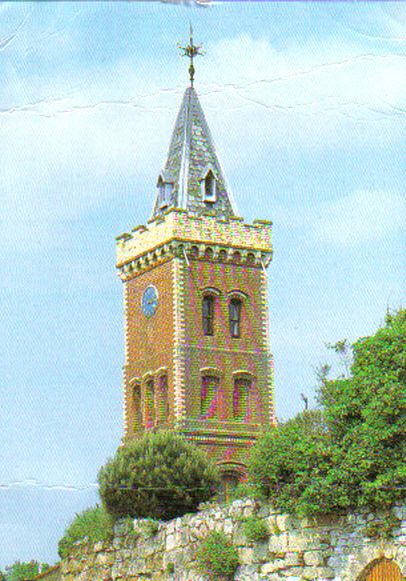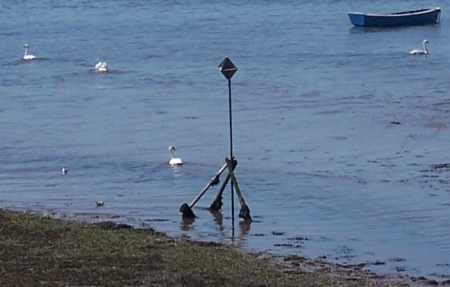Ellen and Jim Have a Blog, Too
We are two part-time academics. Ellen teaches in the English department and Jim in the IT program at George Mason University.


On Living in a Clock Tower by the Sea · 26 July 06
Dearest Marianne,
We got back last night at 12:15 pm EST and 24 hours 15 minutes later I can begin to tell about our time away.
Tonight: where we stayed in Devonshire.
Edward had told me we were staying in a folly, a tower by an estuary. I had to experience it to know what he meant. All I knew was this was a building erected in the later 19th century by a wealthy landowner when his Lady Bountiful type wife died. It is an imitation in miniature of a famous tower in Venice. The man had also built 5 cottages "for the poor" next to the side of the tower—all of which (despite their small rooms) are worth a great deal of money on the real estate market today. One cottage was in the midst of renovation while we were there.
Peters’ Tower (the name of the tower-folly) is four floors high. On each floor is 1 tiny room, 3 of which were made to resemble the inside of a modest temporary-live-in sailboat. These are: on the top or 4th floor two narrow bunk beds with a tiny bureau and closet across the way. Above the beds is a square box I discovered to be the workings of the clock itself which bonged on the hours from 7 in the morning (7 bongs) to 10 at night (10). On the 3th floor a tiny living room; a seat divided by a narrow table on the one side, and desk on the other, with a set of book shelves and books over it. On the 2nd floor a kitchen, just big enough for stove, sink, a few cabinets, small fridge. It has the best ventilation: 2 sets of 2 windows on the walls facing one another. On the bottom the bathroom, a tub with shower, a sink, and toilet with heating towel rack beside it.
The beautifully-designed gray iron spiral staircase winds narrowly and relentlessly vertically up and up and up. Round and round I went, holding onto the bannistered rail, ever facing front while the tower had already turned to my left and higher. By the end of the 2nd day I found myself planning before I moved from one floor to another so as to save trips. My thighs shook from strain. Edward said it was better than a stairmaster.

We felt what it might be like to live in a traditional lighthouse. The estuary Edward had spoken of was a mouth of the Exe River, and every 6 hours the tide altered from high to low. Since the tower was so narrow and there were many windows, we felt like it was a thin skin and we were living outside in the rhythms of nature. We were as close to living outside a building as being in a building allows. The walls were that narrow and the windows that frequent. The people inside are subject to, intensely aware of, alternations of dark and light, water in and water out. We could hear the water lapping. I imagine one would be intensely aware of snow, hard rain, storm. The trains from Exmouth to Exeter St Davids and back again and across the way from Exeter St Davids to Torquay and back went back and forth every half hour on each side of the river. We could hear them honk and rattle. The sun would come up at 5 am and the sky was still glowing at 11 pm.
One morning when the tide (moon) had made the waters high, moving up close to the tower, we watched many people come out to reach the many sailboats moored near said tower. Some people rowed out, and then there was the complicated business of getting into the sailboat and mooring the tiny boat. Some were men who walked to the boat and whose wives waited on shore until the male brought the boat close up to her. We watched dogs revelling in the water. The people who lived in the nearby cottages came out and hung up wash.
Some swans arrived from a nearby swannery. How graceful they looked as they swam around at high tide.

In the evening people from all over the village would walk out on a brick wall built to hold water in. We would hear a nearby set of people sitting on their rooftop by the sea. The sailing club was nearby and we could see people there puttering about. Across the way from our tower was the ruined castle of two county families in the early modern era. The ruined castle and a round 18th century pavilion built for the ladies of a family to sit apart in together are not quite in desuetude as tourists come to see them.
The movement of water and people and animals, the wind and the changing rhythmic life gave me a sense of belonging to natural rhythms. If only I had not had to experience the heat too—though the tower was cool at night every night we were there.
The tower is a landmark by the sea in Lympstone village, itself made up of many small houses clustered in mazes and labyrinths, with gardens everywhere, three pubs (central to evening life) and one church first built in the 14th century but added onto much. Higher up on slight hills and as you move away from the center the houses turn into mansions. Today they are lived in by people with high incomes.
Lympstone was once a fishing village, filled with mostly very poor people. Many of its buildings go back to the 18th and 19th century. Why tourists have not discovered it I don’t know. Perhaps it lacks flash? One-third of the modern inhabitants are retired, and many of the rest drive or bicycle to work in Exeter, a city as high on an ever-steeper hill as you may imagine. Except that the occupation of many of the people is now sailing during retirement, the life of the community has not outwardly changed that much: a church originally founded in the 14th century much of which now stems from the 19th is the center of a parish council which seemed to control what could be built. Evenings people went to the pubs.
The beauty of the place, its quiet atmosphere and activities so clearly consonant with the rhythms of human beings and the natural world was deeply alluring. By the end of the week people were saying hello to us when we came into a pub and walked about.
Lympstone is one stop from a military encampment of the type Patrick White described in his very great The Village that Died for England. No one is allowed to get off the train stop to this place. There are men there with big guns making sure you don’t get off. In the distance you see groups of young men "being trained." Yes.
Exeter itself (about 20 minutes away from Lympstone by train) was founded by Romans as a location which had natural defenses.
While we were there it was very hot. Still. Not a breath of wind.
It was too hot to take country walks as we had done with Yvette when we stayed in the 15th century gatehouse (Shute) near Lyme some 5 years ago. We had no car. I was busy at the University of Exeter most of the day between Monday and Wednesday. In the evening we walked along the beach by the side of miles of red sandstone rock cliffs.
On the Thursday when the conference was over, we did take a train to Torquay which labels itself the English Riviera. Torquay is a beautiful city which is built on ever-taller hills by a harbour. The day we were there it was that hot we stayed in the shade, hardly anyone had a blanket or even sweater who sat in a beach chair and there were actually groups of people in the Channel—which was a turquoise green-blue for the occasion. We ate in an Edwardian pavilion overlooking the sea and watched boats sailing outwards.
More on the conference itself (Monday through Wednesday) anon,
Elinor
--
Posted by: Ellen
* * *
Comment
- From Dagny:
"Dear Ellen,
How wonderful it must have been staying in Peter’s Tower. I can’t even imagine being able to soak up that great atmosphere.
Sounds like you and Jim had a lovely trip.
Dagny"
— Elinor Jul 27, 12:36am # - Thanks for the lovely description. I googled for Peter’s tower and found an interesting article in the Guardian about how Jonathan Coe the writer stayed there while writing. Didn’t you feel the writerly emanations?
http://books.guardian.co.uk/summerreading2004/story/0,14706,1283197,00.html
How nice that we both had such special English (speaking) holidays at the same time, even if we didn’t meet up!
Diana
— Diana Jul 27, 6:55am # - Humph, the website of the article didn’t come across. Well, it’s googleable for, and worth reading. And I merely added afterwards, wasn’t it nice we both had such delightful English holidays at the same time, even if we didn’t meet!
Diana
— Diana Jul 27, 6:57am # - A good friend from Trollope-l teased me that he "imagined you would be doing heavy networking, and did not conceive of you living in a personal ivory tower."
Funny. Edward’s reply was the tower is made of polychrome brick.
And I replied:
"I never network. Not really. I don’t know how. Anyway I’m an adjunct and have been so for a 30 year span. I’m not taken seriously as a career scholar because I've not worked for a high position in any university. I was thanked for coming.
I usually don’t stay at the places the conferences are held because I can have uncomfortable encounters. I have experienced spite and putdowns because of my adjunct status -- coming out resentment as in how dare you come here and critique my paper or behave as if you were equal.
Having Nick and Clare at the Trollope conference was a great boon for me beyond making new friends. I had someone to have lunch with. Someone to sit with when they chose the same panels."
E.
— Elinor Jul 31, 8:03pm #
commenting closed for this article
